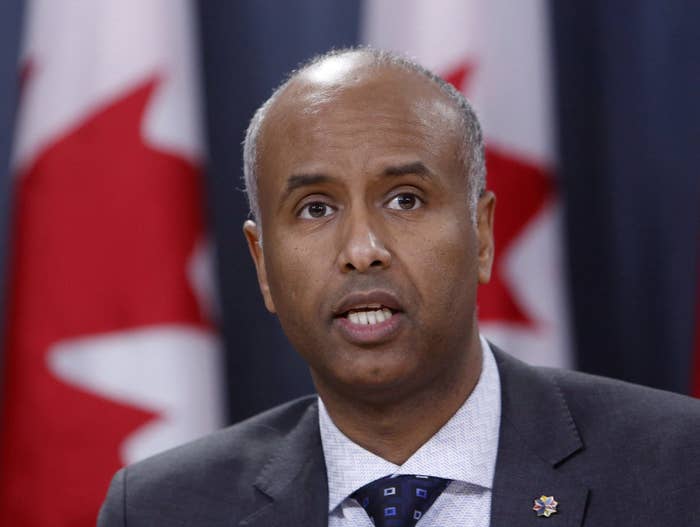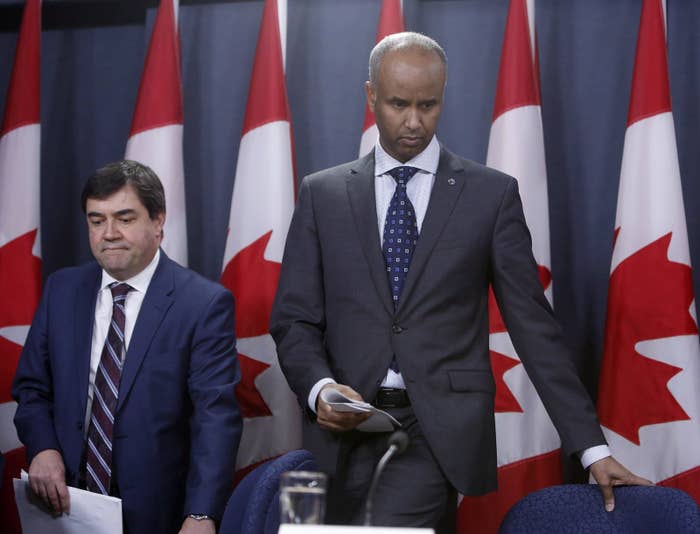
WASHINGTON — The Canadian government said Sunday that it will assist US-bound travellers who have been stranded in Canada by President Donald Trump's recent executive actions.
Canadian Immigration Minister Ahmed Hussen said the country is offering temporary residence permits to those affected by Friday's executive action, which banned entry to the US for citizens of Iran, Iraq, Syria, Somalia, Sudan, Libya, and Yemen.
"Let me assure those who may be stranded in Canada that I will use my authority as minister to provide them with temporary residency, if they need it," Hussen told reporters in Ottawa.
Canadian airlines stopped allowing passport holders from the seven listed countries to board flights to the US on Saturday, even if they had green cards or visas.
“A small number of passengers aboard Canadian flights have been denied boarding,” Hussen said.
But he said that as of early Sunday afternoon, the Canadian government was unaware of any travellers stranded in Canadian airports. He said no Canadians had called for consular services yet either.
Meanwhile, in the US, more than 100 people — including US green card holders and small children — have been detained in airports due to the ban, prompting protests in more than a dozen major cities.
Republican members of Congress have since criticized Trump's executive action, saying it needs to be narrowed and clarified.
Hussen also confirmed Sunday that, despite US government departments saying otherwise throughout Saturday, Canadian dual nationals and permanent residents who are also citizens of one of the seven banned countries will not be affected by Trump's action. Still, Hussen urged those people to travel using their Canadian passports.
Trump's executive actions Friday barred citizens of the seven Muslim-majority countries from travelling to the US for 90 days in an "extreme vetting" measure that the president claimed would stop terrorists from entering the country. The actions also suspended the entire US refugee program for four months and indefinitely halted the resettlement of Syrian refugees in the US.
Early on Saturday, both the US State Department and Department of Homeland Security said all dual citizens with citizenship from one of the seven banned countries would be denied entry to the US.
There were 35,000 Canadians who shared citizenship with one of those countries in 2011, according to Statistics Canada. Another 75,000 people born in those countries live in Canada but are not full Canadian citizens. Those figures would all but certainly be higher today.
But the Prime Minister's Office said late Saturday night that it had been assured by White House National Security Adviser Michael Flynn that Canadians wouldn't be affected by the ban.
“Senior officials have been working to seek clarity for Canadians from the US Department of Homeland Security and US Department of Transportation, amongst other counterparts,” wrote PMO spokesperson Kate Purchase.
“NSA Flynn confirmed that holders of Canadian passports, including dual citizens, will not be affected by the ban,” Purchase said. “We have been assured that Canadian citizens travelling on Canadian passport will be dealt with in the usual process.”
The UK appears to have received similar assurances.
Hussen himself was thought to be potentially affected by Trump's ban because he was born in Somalia. But Hussen — who came to Canada as a Somalian refugee in 1993 — confirmed Sunday that he holds only Canadian citizenship.
"I continue to be proud of our country, our ability to be generous," he said in response to a question about how he felt about the US ban.
Trudeau’s national security advisor Daniel Jean, who said he had been in contact with Flynn throughout Saturday to figure out what was happening, told reporters that the White House had not given the Canadian government any head's up about Trump's executive actions. Jean said he found out about it in the news.

Jean said that in his first conversation with Flynn about the ban, "it was clear [...] that they had not intended to" to include Canadian citizens in the ban.
He also said he doesn't "think that the order by itself makes the world any safer."
Hussen said Canada will be looking into policy to address the changes wrought by Trump's actions, but won't be increasing the number of refugees it resettles. "We are doing our part as a country," Hussen said.
Though Canada has recently capped the number of privately sponsored refugees it will accept this year, citing a lack of resources to process applications, the overall refugee resettlement target for 2017 is 25,000.
"Canada will continue to be a country that will welcome immigrants," Hussen said. "All levels of government continue to work with our American counterparts in seeking clarification on these changes and we will continue to update you."
With files from Paul McLeod
